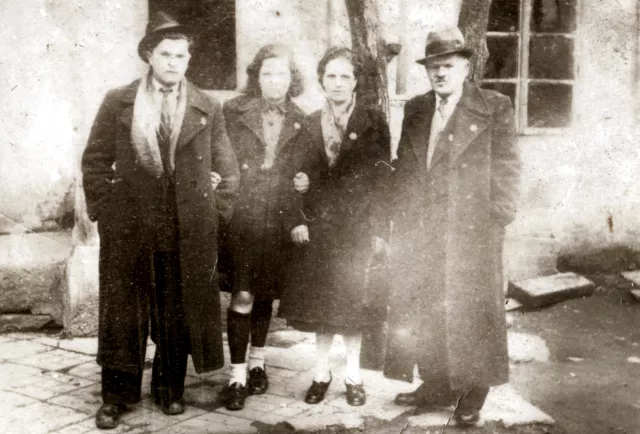The Konorti family interned in Kiustendil
This is a picture of my family when we were interned in Kiustendil. We are all wearing badges. The photo was taken in the yard of the house of a cousin of my mother's, Matilda. My mother was born in Kiustendil and when we were interned there, Matilda sheltered us in her house. My mother suffered from stomach aches and she was ill all the time, so we had to buy fresh milk for her. But at that time, we didn't have the right to buy even one liter of milk. One of our neighbors offered to buy one bottle from the milkman for us. The courtyards between the houses were separated by low fences, so she could easily pass it to us. She did not realize what could happen if somebody saw her. She took the bottle of milk and passed it to us. Brannik members saw her and came to our house. We did not even have an oven at home. We only had one small hotplate in the corridor, where my mother used to cook. The Brannik members rushed into the house and started to kick the hotplate and spilled the milk. They were very aggressive.
My ancestors came from Spain two centuries ago. They belong to the Sephardi settlers' group that came to the Balkan Peninsula in the 18th century.
My father was a soldier during World War I. He was born in 1900 and went to the front when he was 17. He was a captive in Italy for a year and a half. That is where he learned a little Italian. He also spoke Ladino, Hebrew and Bulgarian. My father loved to sing, and he really sang very well. He, my brother and I used to sit on the bed in the bedroom on Sundays and sing songs from songbooks. My father sang songs in Ladino. The texts were very romantic. I was 15 when he fell ill. He was bedridden for a year and a half. He died of cancer in 1947 in Sofia.
My brother and my mother went to Israel in 1949. It was very hard for Mordohai in the beginning because he did not know the language. I stayed in Bulgaria. I met Josif Kamhi in 1943 when we were interned in Kiustendil. We married in 1950. I approved of my relatives going to Israel. I also wanted to go there, but my husband insisted on staying here. His brother had died as a partisan and his mother had died in a concentration camp, so he didn't want to part with his sister.
After the war, I worked in dressmaking factories. My husband studied in the mechanical and electrical technical institute in Sofia and became an electrical engineer. Life was calm in the 1950s. Our salaries, homes and work became more secure. That is why I value that period so much. After the political changes in Bulgaria in 1989, life became harder for my family. Everything we had built and fought for started to fall apart. I value Eastern Europe's opening to the world. History goes on. We had capitalism, then socialism, and now a democracy. Life goes forward, and that is how it should be. Changes are natural, but they are very hard for us.






























